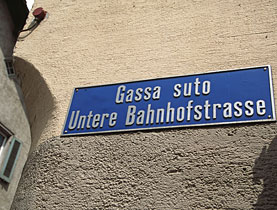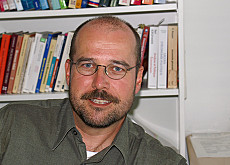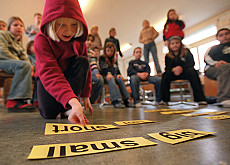Minority languages still under threat

The Council of Europe says despite some progress Switzerland must do more to strengthen minority languages spoken in the country.
The human rights watchdog issued a series of recommendations, mainly to promote Romansh as a living language and protect Yenish, spoken by a few thousand gypsies.
The Council of Europe applauded moves by the federal government to extend the broadcasting time of public radio and television programmes in Romansh.
It also welcomed the decision by the authorities in the eastern canton of Graubünden, where Switzerland’s approximately 35,000 Romansh speakers live, to translate its statutes into the Latin language.
But it said other obstacles remained to the use of the language in Graubünden, where German speakers are in the majority. It urged significant measures to ensure the use of Romansh in courts, in dealings with the cantonal administration and in parliamentary debates.
The Council also called on Graubünden to improve the introduction of the standardised version of Romansh in schools “in a way that has a positive impact on its protection and promotion as a living language”.
In response to the Council’s recommendations on Romansh, Constantin Pitsch of the Swiss Culture Office warned that support for additional moves to promote Romansh was lukewarm. “If canton Graubünden proceeds in this manner [the Council] must be aware that the population is not completely favourable.”
Travellers
Regarding Yenish, the Council’s Committee of Experts regretted that Switzerland, which signed the European Charter for Regional or Minority Languages in 1993, had still not recognised Yenish as such.
The Swiss authorities have said they are not prepared to extend “official recognition” to Yenish. However, Pitsch emphasized that Switzerland was making efforts to help the so-called travellers maintain their language.
“We are in contact with travellers and are putting together a project that aims to reinforce the language of Yenish,” he said.
Although the Strasbourg-based watchdog focused its recommendations on Switzerland’s Yenish and Romansh populations, it also investigated cases where French, German and Italian are in a minority language situation.
The survival of a German dialect spoken in a village in Italian-speaking Ticino was one cause for concern.
German minority
The Council was informed by the local authorities that they might discontinue the teaching of German in schools altogether instead of implementing the recommendation to increase it beyond two hours per week.
This would occur as part of a merger of the German-speaking village of Bosco-Gurin with Italian-speaking municipalities.
“The Committee of Experts encourages the competent Swiss authorities to ensure that new administrative divisions do not constitute an obstacle to the promotion of German in Bosco-Gurin, in particular in education,” the report said.
It noted that awareness of the existence of Italian-speaking communities in Graubünden was low even if the overall situation of the language in the canton remained good.
Speaking to swissinfo, a professor at Geneva University specialising in language policy evaluation, François Grin, welcomed the report’s focus on concrete measures to promote minority languages.
“The very fact that those recommendations are not couched in terms of rights or in terms of legal standards, but are formulated in terms of actual impacts of policies is evidence of the forward-looking character of the Charter and of the fact that the whole discourse about minority protection and promotion has made progress in recent years,” he said.
swissinfo
Approximately 0.5% of the Swiss population speak Romansh.
There are an estimated 2,000-3,000 Yenish speakers in the country.
Graubünden is Switzerland’s only trilingual canton, with German, Romansh and Italian-speaking communities.
Ensure that the introduction of Romansh Grischun in schools is done in a way which has a positive impact on the protection and promotion of Romansh as a living language.
Take the necessary measures to strengthen the use of Romansh in dealings with Romansh speakers by the cantonal administration and by municipalities in which there is a German-speaking majority and a Romansh-speaking minority.
Pursue dialogue with the representatives of the Yenish speakers.

In compliance with the JTI standards
More: SWI swissinfo.ch certified by the Journalism Trust Initiative











You can find an overview of ongoing debates with our journalists here . Please join us!
If you want to start a conversation about a topic raised in this article or want to report factual errors, email us at english@swissinfo.ch.